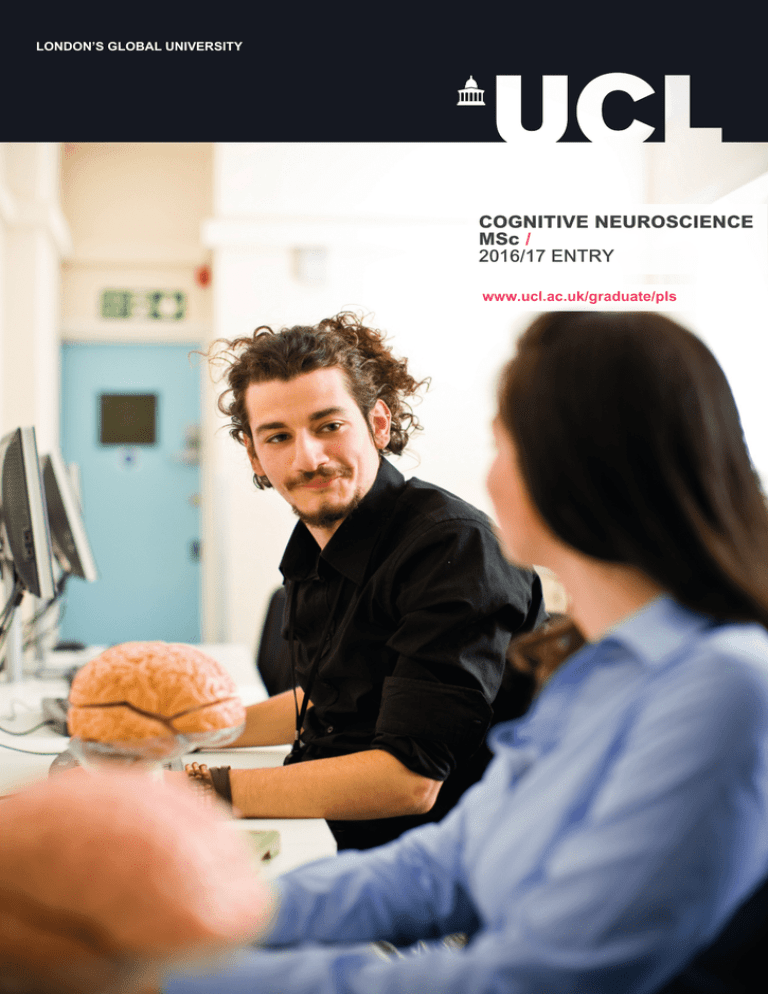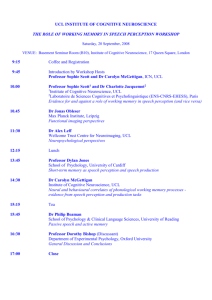COGNITIVE NEUROSCIENCE MSc / 2016/17 ENTRY
advertisement

LONDON’S GLOBAL UNIVERSITY COGNITIVE NEUROSCIENCE MSc / 2016/17 ENTRY www.ucl.ac.uk/graduate/pls Cognitive Neuroscience MSc / The Cognitive Neuroscience MSc at UCL is a research-led, state-of-the-art degree programme on mental processes in the human brain. The programme brings together some of the world's leading researchers in cognitive neuroscience and cognitive neuropsychology. Degree structure Mode: Full-time: 1 year Students undertake modules to the value of 180 credits. The programme consists of eight core modules (120 credits) and a research dissertation (60 credits). CORE MODULES Degree summary // Communication Skills in Cognitive Neuroscience // Current Issues in Cognitive Neuroscience I: Fundamental Processes Students learn about the relationship between the mind and the brain in patients and healthy individuals, alongside the ideas, methodology, and current state of knowledge in cognitive neuroscience. They receive case demonstrations of brain-damaged patients, insights into transcranial magnetic and direct current stimulation, and experience with functional neuroimaging techniques. // Current Issues in Cognitive Neuroscience II: Elaborative and Adaptive Processes // Current Issues in Cognitive Neuroscience III: Translational Research // Methods in Cognitive Neuroscience I: Lesion Approaches // Methods in Cognitive Neuroscience II: Neuroimaging // Research Methods (Statistics) // Structure and Function of the Brain // UCL is among the principal research centres in the world in this area and offers an ideal environment to study cognitive neuroscience. OPTIONS // Our work attracts staff and students from around the world. Together they create an outstanding and vibrant environment, taking advantage of cutting-edge resources such as a behavioural neuroscience laboratory, a centre for brain imaging, and extensive laboratories for research in speech and language, perception, and cognition. DISSERTATION/REPORT // Opportunities for graduate students to work with world-renowned researchers exist in all areas of investigation. The division offers a supportive environment including numerous specialist seminars, workshops, and guest lectures. The programme is delivered through a combination of lectures, tutorials, problem classes, laboratory classes and student presentations. Depending on the chosen taught modules, it includes case demonstrations of neuropsychological patients, hands-on experience with the analysis of neuroimaging data, critical analyses of published scientific papers, and discussion seminars. Assessment is through examinations, essays, practical exercises, reports and the the research dissertation. // // There are no optional modules for this programme. All students undertake an empirical research project in the area of cognitive neuroscience, which culminates in a dissertation of 10,000–12,000 words. Your career The MRes is a very selective programme that develops key research skills in the field of cognitive neuroscience and serves as a basis for PhD study in an academic setting or a research career in industry or business. The MRes also promotes key skills that prepare students for more general careers in clinical psychology, marketing, teaching, and consultancy. The first cohort of students on the Cognitive Neuroscience MRes graduated in 2013, therefore very limited information on specific graduate destinations is currently available. Recent career destinations* include: // // // // // UCL Institute of Cognitive Neuroscience, PhD student, 2014 UCL Institute of Cognitive Neuroscience, Research Assistant, 2014 University of Utrecht, PhD student, 2014 National Hospital for Neurology, Assistant Clinical Psychologist, 2014 University of California, Research Assistant Employability Students will have the opportunity to study and conduct cutting-edge research alongside some of the leading researchers in the field of cognitive neuroscience. Students will be immersed in this research environment and will learn directly from experts in the field rather than just text books. * data taken from the ‘Destinations of Leavers from Higher Education’ survey undertaken by HESA looking at the destinations of UK and EU students in the 2010–2012 graduating cohorts six months after graduation and, where necessary, departmental records. Entry requirements Normally a minimum of an upper second-class Bachelor's degree from a UK university or an overseas qualification of an equivalent standard. FEES AND FUNDING // UK & EU (2016/17) entry: £10,130 (FT) // Overseas (2016/17) entry: £24,400 (FT) English language proficiency level // UK & EU (2016/17) entry: £5,195 (PT) If your education has not been conducted in the English language, you will be expected to demonstrate evidence of an adequate level of English proficiency. // Overseas (2016/17) entry: £12,310 (PT) Full details of funding opportunities can be found on the UCL Scholarships website: www.ucl.ac.uk/scholarships The level of English language proficiency for this programme is: Good. Information about the evidence required, acceptable qualifications and test providers is provided at: www.ucl.ac.uk/graduate/english-requirements Your application APPLICATION DATE All applicants: 29 July 2016 CONTACT Mrs Esther Huntbach Applications will close once all places on the programme have been filled. Email: cogneuro_admin@ucl.ac.uk When we assess your application we would therefore like to learn via your personal statement: Telephone: +44 (0)20 7679 4754 // // // why you want to study Cognitive Neuroscience at graduate level // // if you have a particular research project in mind // how your academic and professional background meets the demands of this rigorous programme // how completion of the Cognitive Neuroscience MSc will help you obtain your short- and long-term career goals why you want to study Cognitive Neuroscience at UCL which module (s) on the Cognitive Neuroscience programme interest you most and why your knowledge and interest in the subject demonstrated by briefly discussing a specific book or article that you have read that aroused your interest in the topic of cognitive neuroscience Together with essential academic requirements, the personal statement is your opportunity to illustrate whether your reasons for applying to this programme match what the programme will deliver. Details on how to apply are available on the website at: www.ucl.ac.uk/graduate/apply PDF Updated: May 25, 2016 Information correct at time of going to press. See website (www.ucl.ac.uk/pals) for latest information



